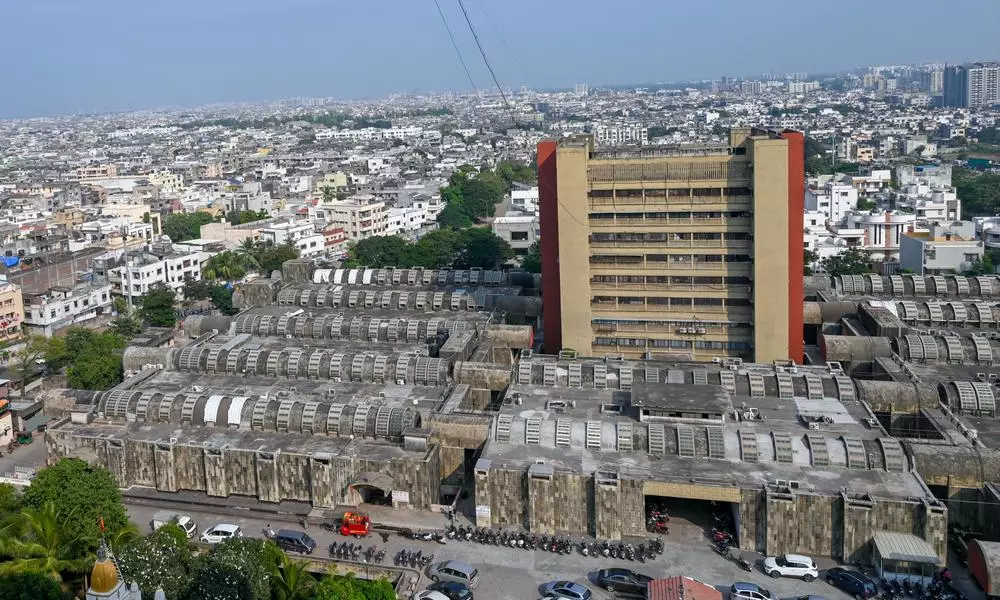
Growing protest in Surat against Disturbed Areas Act in 'peaceful parts'
Textile trade says it's hit hard by restrictions on renting and selling of properties, and need for extensive documentation and legal fees

Surat, the textiles hub of Gujarat, is feeling the heat of the Disturbed Areas Act. The Federation of Surat Textile Traders Association (FOSTTA) has urged the state government to remove textiles from the Act's jurisdiction.
In a letter to Chief Minister Bhupendra Patel and Home Minister Harsh Sanghavi, FOSTTA outlined the issues faced by traders to obtain a compulsory “Ashant dhara” certificate from the district authorities. “The process of renting shops has become difficult for the traders, especially in Salabatpura, Mahidharpura and Limbayat areas of the city,” the letter said.
“Besides paying a lawyer for the process, the textile traders have to spend Rs 8,000 to get the necessary documents, which is an additional financial burden. Adding to that, the process is time-consuming and complicated,” said Champalal Bothra, Secretary General of FOSTTA.
The issue came up a week after Kailash Hakim, said to be a close aide of state BJP chief CR Patil, was elected the new president of the traders’ body. The body, which represents over 75,000 traders in over 200 textile mills across Surat, held elections after a gap of 11 years.
Unwarranted move
Following the letter by FOSTTA, the Surat Textile Brokers Association filed a petition against the implementation of the Disturbed Areas Act in the “peaceful areas” of the city.
“The sale and renting of properties in commercial areas of Begumpura and Zampabazar in the jurisdiction of Salabatpura police station is unwarranted as the majority of the owners in the area are Hindu and the area has been peaceful,” read the petition.
Advocate Virat Popat submitted in the Gujarat High Court that “the area on which the Gujarat Prohibition of Transfer of Immovable Property and Provision for Protection of Tenants from Eviction from Premises in Disturbed Areas Act, 1991 (Disturbed Area Act) has been imposed is a textile market” with 40,000 shops and there are no residential units in the area.
“Besides, there is no history of communal violence, mob violence or riots in the area. Therefore, it is not right to invoke the law that restricts the transaction of properties in the area. The trade is being affected because of the restriction on renting and selling of properties in the area," said Popat.
Following the petition, the High Court issued a notice to the state government and Surat’s Collector demanding the justification for imposing the Act in these areas.
This is the first time a non-Muslim party has challenged the Act in a court.
Decision challenged
The Disturbed Areas Act was implemented in the Athwalines, Salabatpura, Chowk Bazaar, Mahidharpura, Saiyedpura, and Lalgate police station areas of Surat in 2017 and then renewed in 2020 for another five years. The step was taken after representations by Purnesh Modi, Sangeeta Patil, Arvind Rana, then BJP MLAs of Surat, and several BJP councillors.
In May 2018, the Disturbed Areas Act was challenged in the High Court by Danish Qureshi, an Ahmedabad-based activist working for minority rights. In 2020, another petition was moved by the Jamiat Ulama Welfare Trust and Nisar Ahmed Mohammad Yusuf Ansari, a member of a minority rights group, challenging the clause of “proper clustering of persons” under the newly introduced Section 2(d) Act that was amended in 2020.
Distress sale
The Gujarat Prohibition of Transfer of Immovable Property and Provisions of Tenants from Eviction from Premises in Disturbed Areas Act, commonly known as the Disturbed Areas Act, was enacted in 1986 by the Congress government.
It was meant to be temporary to prevent the distress sale of properties following the riots in 1985-86. However, it was replaced with a new act in 1991, which empowered the Gujarat government to declare a riot-prone or communally sensitive area as ‘disturbed’.
Following this, the district collectors got the power to notify any area of a city in Gujarat as a ‘disturbed area’. Once the area was declared such, the transfer of immovable property in those areas could only take place after it gets the collector’s nod on an application by both the seller and the buyer along with an affidavit declaring that the seller was selling the property of his/her own accord at a fair market price.
In July 2019, the BJP government moved to amend the Act, claiming that a large number of complaints had been received by the ruling party MLAs about cases where the Act was being flouted due to legal flaws.
The amendment proposed to the existing Act enhanced the scope of the term ‘transfer’ to include the transfer of right, title or interest in or over properties in disturbed areas by means of sale, gift, exchange and lease.
Presidential assent
Under the amended Act, no property in disturbed areas can be registered without prior sanction from the collector. The amended Act also gives the collector more power to asses if there are chances of ‘polarisation’ or ‘improper clustering’ of people of a particular community in an area, thus disturbing its demographic equilibrium.
The amendment received presidential assent on October 13, 2020.

